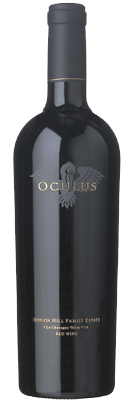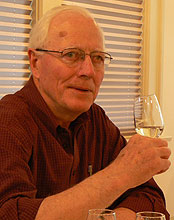

Mission Hill Winery
2004 Oculus(Okanagan Valley)
Mission Hill made a significant change in style with the 2004 vintage of its flagship red, Oculus, which the winery is now previewing prior to its release. This vintage includes substantially more Merlot and less of the other varieties than previous examples. The 2003 Oculus is 47% Merlot, the 2002 Oculus is 50% Merlot.
The change in the blend reflected challenges of the 2004 vintage that made it harder to ripen late reds. Mission Hill spokesman Ingo Grady describes 2004 as a “Right Bank vintage. The Merlot was just exceptional.” The blending panel, which includes consultant Michel Rolland, opted for a Merlot-dominant blend and achieved a spectacular wine. The 2005 Oculus, from a more even vintage, is already bottled with the Merlot component back to the winery’s customary 50%.
Dark in colour, the 2004 Oculus presents aromas of black currants and vanilla that surge from the glass. On the palate, this is a full and generous wine, with flavours of plums and currants. The notes of cedar and cigar box maintain Bordeaux lineage of earlier vintages. Yet without a doubt, this is the richest, most lush Oculus to date. 94 points.
Reviewed September 3, 2007 by John Schreiner.
Other reviewed wines from Mission Hill Winery
|
Mission Hill Winery 2006 Reserve Riesling Fritz Hasselbach Collection (Okanagan Valley)John Schreiner 10/4/2007 |
|
Mission Hill Winery 2006 Reserve Pinot Blanc, Lakeshore Vineyard (Okanagan Valley)John Schreiner 10/4/2007 |
The Wine
Winery: Mission Hill Winery |
The Reviewer John Schreiner
John Schreiner
John Schreiner has been covering the wines of British Columbia for the past 30 years and has written 10 books on the wines of Canada and BC. He has judged at major competitions and is currently a panel member for the Lieutenant Governor’s Awards of Excellence in Wine. Both as a judge and as a wine critic, he approaches each wine not to find fault, but to find excellence. That he now finds the latter more often than the former testifies to the dramatic improvement shown by BC winemaking in the past decade. |




























